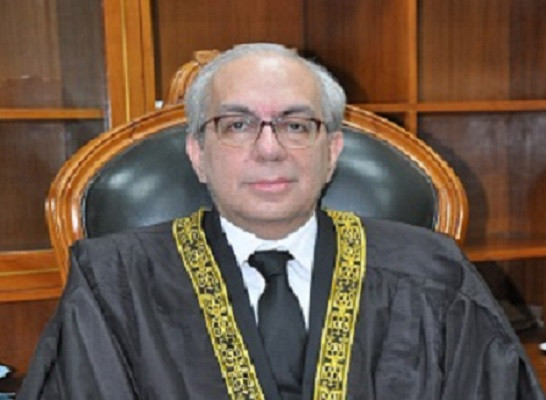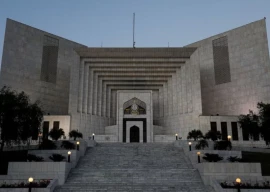
In a development following the retirement of Supreme Court Justice Sardar Tariq Masood, Justice Munib Akhtar has been appointed as a member of the three-judge committee under Section 2 of the Supreme Court Practice and Procedure Act 202.
Legal experts view this as a positive step, as the committee plays a crucial role in forming benches and handling cases filed under Article 184 (3) of the Constitution.
Justice Munib Akhtar's inclusion in the committee gains significance amid Pakistan Tehreek-e-Insaf's (PTI) plans to approach the apex court, seeking relief regarding alleged electoral rigging.
The committee will also be responsible for forming a new, larger bench to hear the government's intra-court appeals against the judgment declaring trials of civilians in military courts as unconstitutional. The composition of the bench is crucial in handling politically sensitive cases.
Yasser Kureshi, a lecturer in South Asian Studies at Oxford University, said that the presence of Justice Munib on the committee will be a positive development.
The reason the committee was originally formed was to limit the CJ’s discretion in bench formation, and the presence of a strong dissenting voice like Justice Akhtar will help realise the committee’s purpose to constrain the CJ’s discretion and produce fewer partial benches, and hopefully more larger benches for important cases"
Kureshi also hoped that upcoming important election-related cases would not only heard by the same three-member bench that has been hearing them so far; and that the committee is consulted for the formation of benches for these important cases.
Advocate Abdul Moiz Jaferii said that the “one-way traffic” that has been ongoing since Justice Ijazul Ahsan resigned will come to an abrupt halt.
"I think even when Ijazul Ahsan was around, his opposition to matters he considered wrongly handled was tepid and weak. I feel that Justice Munib will be a fundamentally different proposition," he reckoned.
It is pertinent to note that Justice Munib Akhtar – known for using the term 'master of roster' for the CJP to form benches in his judicial opinions – was part of several special/larger benches during the tenure of ex-CJP Umar Ata Bandial.
He was one of the minority judges who withheld approval for the Supreme Court Practice and Procedure Act 2023.
Despite strong opposition from powerful circles, Justice Munib Akhtar stood firm on his stance to conduct elections for the Punjab and Khyber Pakhtunkhwa (KP) Assemblies within 90 days. He was also a member of the larger bench that declared trials of civilians in military courts unconstitutional and has faced criticism for his ruling on the interpretation of Article 63 A of the Constitution.
However, a section of lawyers is drawing parallels between this decision and a recent judgment. In that judgment, it was affirmed that the SJC could continue proceedings against any judge even after their resignation or retirement.
Read: Ex-SC judge found guilty of misconduct
During the tenure of ex-CJP Bandial, there were visible divisions among judges, which were reduced after the resignations of Justice Ijazul Ahsan and Sayyad Mazahar Ali Akbar Naqvi, both belonging to the same camp.
Now, Justice Munib Akhtar's inclusion in the committee adds an interesting dynamic. Justice Ijazul Ahsan, who also ruled against the Supreme Court Practice and Procedure Act 2023, fulfilled his responsibilities as a member of the three-judge committee until his retirement.
Even during his tenure on the committee, Justice Ahsan raised objections to the composition of the larger bench in the military courts case and the special bench assigned to hear Judge Mazahar Ali Akbar Naqvi's petition.
Following his sudden retirement in January, Justice Syed Mansoor Ali Shah took over as a member of the committee. Senior lawyers believe that with the inclusion of Justice Munib Akhtar, Justice Shah's opinion will be crucial in the committee led by CJP Isa.
According to the law, decisions in the committee are made by a majority. Similarly, Justice Munib Akhtar has also become a member of the Supreme Judicial Council, a constitutional body responsible for addressing complaints of misconduct against superior court judges. During the tenure of the incumbent Chief Justice of Pakistan, Isa, the influence of judicial politics cannot be disregarded.
Both Ijazul Ahsan and Munib Akhtar expressed dissent regarding the establishment of a subcommittee tasked with proposing amendments to the rules of the Judicial Commission of Pakistan (JCP), a constitutional body responsible for considering the appointment of judges to superior courts.
It has been observed that Justice Munib Akhtar, Justice Ayesha Malik, and Justice Shahid Waheed did not participate in larger benches following their decision declaring trials of civilians in military courts as unconstitutional.
Nevertheless, several important election cases were presented before the bench presided over by Justice Munib Akhtar before the elections.
Meanwhile, the swearing-in ceremony for Justice Naeem Akhtar Afghan as a Supreme Court judge is scheduled for Monday (today). His appointment is expected to enhance the position of CJP Isa, who currently faces two vacant seats in the Supreme Court.
Moreover, legal bodies continue to advocate for amendments to the JCP rules, expressing concern over the delay in convening a commission meeting to discuss amendments to the JCP Rules of 2010.






1728201119-0/Copy-of-Untitled-(11)1728201119-0-270x192.webp)
1728198348-0/Untitled-design-(19)1728198348-0-270x192.webp)

1728198641-0/Copy-of-Untitled-(9)1728198641-0-270x192.webp)
1728196512-0/Untitled-design-(4)1728196512-0-270x192.webp)










COMMENTS
Comments are moderated and generally will be posted if they are on-topic and not abusive.
For more information, please see our Comments FAQ